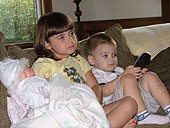 |
| TV rules: Unregulated exposure to the media may be harmful for children |
The boy and girl were both five years old — and they left members of the Indian Association of Counsellors shocked and disturbed. The two kindergarten students had locked themselves in their school washroom for about half an hour a fortnight ago. When they emerged — after the school peon repeatedly banged the door — they said they had taken off their uniforms and kissed each other’s private parts.
“The little boy had got the idea from pornographic movies that his mother watched at night,” says Faheema Ansari, a Mumbai-based counsellor who dealt with the case. The embarrassed mother said she had no idea her little boy had been sneaking a peek.
Some days before this incident, three boys — all under the age of 10 —were brought in for counselling for regularly beating up other children in their orphanage. All through the session, they talked about their screen idols, Salman Khan, Hrithik Roshan and Sanjay Dutt. “The message was: if you want to be regarded as strong and macho like these men, you have to emulate their behaviour in the movies —which could be violent,” says Mansi, a clinical psychologist who counselled the boys.
Clearly, the impact of the media — now more diverse and widespread than ever before — is becoming a matter of concern. The Internet has also turned into a regular headache for teachers and counsellors. Some nine-year-old students recently told Kavita Shivdasani, an educationist in Mumbai, how easy it was to access sex on the Net. Just type sex dot com or porn dot com, they said.
Recently, Mansi saw a child who was in the habit of sketching nude pictures that he had seen on the Net, guided by an older relative.
Parents and teachers blame the media for this sort of behaviour on the part of children. To fight the effect of television, Mumbai lecturer Merlin Fernandes has made sure that there is no TV at home. “I refuse to buy a TV set till my children (six and nine years of age) are old enough to discern what they should take in and what they should not,” he says. School teacher Samita Rai keeps the TV in a common room, so that the family can monitor what the children watch.
But there are some who hold that the media can’t be held responsible for behavioural changes — that parents have a significant role to play as well. And the dangers of lax parenting, adman Prahlad Kakkar says, could only create more “social aberrations like Manu Sharma, who, not used to be refused anything, will whip out the gun and shoot.” Or like a 16-year-old in Mumbai, who was arrested in December for terrifying his classmates with a convincing replica of a revolver.
“It is good parenting that should be setting role models for children” stresses Sanjay Gadhvi, who drew serious flak after two youngsters in Mumbai died while aping dangerous stunts from his film, Dhoom 2.
Problems also arise when children hold stars as their role models, leading to a situation when real life gets drowned by the larger-than-life images on screen. “Then they start to believe that any kind of behaviour is acceptable,” says Rehana Salaam, the principal of an SOS Village near Lonavala. She recalls that a 16-year-old boy told her that he believed Salman Khan — whose car had mowed down people sleeping on a pavement — was victimised because he was a star. “And why did those people have to sleep on the pavement in the first place?” was his question.
Parents, educationists advise, need to keep a constant dialogue going with their children. In a municipal corporation school in Mumbai, counsellor Shabnam Kazi says the older boys come to school, “hair gelled, silver chain around their necks and uniform altered to look more chic.” But though they wear their heroes on their sleeves, it’s Kazi who is their role model. That’s because, “unlike most people in their circle, I listen and care about them,” she says.
Gadhvi holds that parents should supervise the films their children watch. “I monitor every film that my daughter sees,” he says. But then, he points out that there are parents who organised a private screening of Dhoom 2 for a children’s birthday party.
Selective viewing of films and television, many argue, help children, while popular cinema can also benefit the young. “If I speak to my students about the Revolt of 1857, they talk of Mangal Pandey. A mention of Mahatma Gandhi results in a lengthy discussion on Lage Raho Munnabhai,” says Shivdasani.
The trouble with generation next’s choices, says Salaam, also stems from the fact that “we have stopped telling them good stories. Instead of telling them about heavenly heroes, we need to tell them about everyday heroes.”
At the end of the day, film makers lay the onus of the consequences of cinema or TV on the viewer— or in this case, parent and child. “I might just do a film that is horrifically violent and has nudity to get acclaim as an international film maker. But that’s a film,” says Gadhvi.
To stress his point, Gadhvi says that he picked up smoking at an early age by simply watching his father smoke. And he is not too different from four-year-old mildly autistic Kartik, who parrots his father’s view: “Don is not a good man!” The media may leave its impact — but it seems that parents have the last say.

